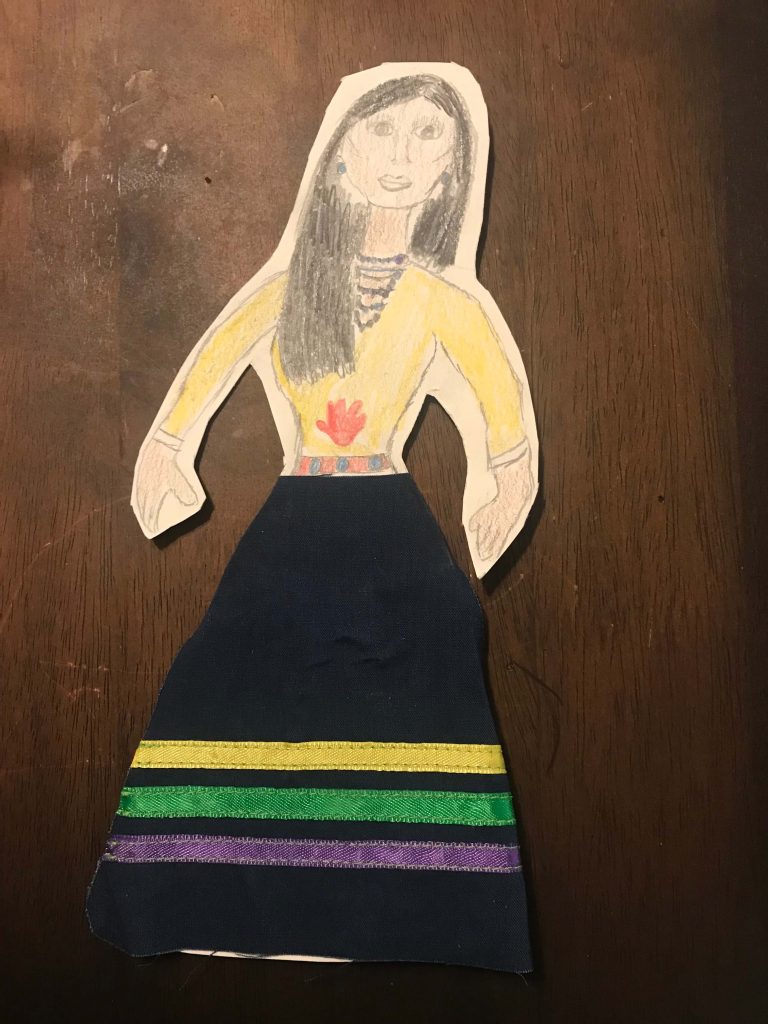During the onset of the pandemic in 2020, Stone Child College (SCC) received a TCU-Head Start partnership grant, To Come Together for our Children, to partner with three Tribal Colleges and Universities (TCUs) and the University of Montana-Western (UMW) to deliver post-secondary programs in Early Childhood Education (ECE) to early educators. UMW delivers its ECE bachelor’s degree program asynchronously online, and the TCUs deliver Child Development Associates (CDA) and ECE associate degree programs.
The timing of the partnerships and experiences demonstrated that trauma caused by the pandemic compounded the chronic stress that many Native Americans experience. People who experience the damaging and continual effects of historical trauma are particularly vulnerable to the impact of the pandemic. SCC discovered that one way to relieve stress is to reflect on personal experiences and apply both internal and external resources to navigate a new normal.
Being able to tell one’s own story is an impactful way to deal with the stress and impacts of trauma, whether historic or current. By being truly heard, a part of the brain responsible for helping us to feel good and connected is activated. But when our communication is interrupted or disrupted, our brains interpret this type of communication as a threat, releasing cortisol and other stress hormones that produce more stress and anxiety. This stress response, when it occurs repeatedly, creates patterns of disruptive communication and poor coping skills. However, when we are provided with opportunities to communicate in ways utilizing our strengths and our cultural values, we can build on our skills to help us to heal and be well.
When reflecting on the work of SCC Early Childhood Education program students we noted when they had opportunities to reflect on and present their work as ECE teachers in the context of their cultures, they advanced and communicated their learnings more effectively, while simultaneously developing culturally relevant, positive mental health skills.
Culture provides both internal and external resources for healing and learning. Our students, primarily located on four Montana Indian reservations, come from culturally diverse backgrounds. To honor these backgrounds, SCC received funding from the American Indian College Fund for an Idhuwiyayapi Advancing Indigenous ECE Project to enhance the college’s ability to create and deliver culturally appropriate Indigenous Early Childhood Education curricula. These grants complement each other, creating culturally relevant programs and support for our ECE students.
A paradigm shift in one instructor’s courses resulted from our focus on mental health, promoting growth in learning and healing and creating transformative early childhood education. Terri Barclay, the mentor and instructor for master’s and bachelor’s degree programs uses culturally grounded learning activities and assessments to advance student learning while building resilience among ECE candidates. Terri provides tutoring, IT support, instruction, and coaching to support students with various issues that challenge them and often keep them from succeeding in their post-secondary coursework. Terri is also an instructor for the ECE bachelor’s degree program at the University of Montana Western.
While teaching and mentoring SCC ECE students, Terri noted their’ need for counseling and mental health support. We began providing online counseling for SCC students located across the state of Montana, often living in rural areas with no access to a counselor. We also strategically decided the need to work on our own mental health to be our best as we work with others.
SCC changed its approach to self-care and mental health by contracting with Healing Your Almond and its founder, Franchon Francees. SCC participated in a two-day workshop on culture, trauma, and healing, and met with Franchon each month to work on personal and professional issues around healing and mental health. During one meeting with Franchon, it was noted that the students in our courses who were struggling the most were those who were not only challenged with the pandemic and trauma, but also with online asynchronous courses that did not allow them to communicate in culturally meaningful ways.
ECE students are required to write and submit responses to discussion questions in an online chat, and some students were worried about peers and instructors making judgments about them and their writing. Some students went all semester without posting anything. There were also few opportunities in most asynchronous classes for students to meet together.
Terri changed assignments and assessments to address this challenge. Without altering the purpose of the assessments, Terri worked to identify other ways to assess students’ learning while allowing them to demonstrate their knowledge. Terri moved beyond the typical question-answer format of learning assessments and designed two assignments that are highlighted as exemplars in culturally relevant instruction and assessment.
One lesson focused on creating a paper doll and the other for students to focus on their own names. Both assignments highlight the importance of culturally grounded education and the benefits of being heard. These assignments resulted in 100 percent participation of students as well as student writing demonstrating confidence that is not typically shown in the online environment. Students reported that they felt they could connect with the objective of the assignments and stated they would like more assignments of this nature. When asked to reflect on the experience of designing a paper doll in their image, students reported that they enjoyed the opportunity to create a doll in a manner that represented aspects they would like others to see. When asked about writing about their names, the students were insightful:
“Your name is part of your identity and family history, and it should be celebrated and appreciated.” -JM
“This activity could enrich cultural experiences for the children who have names in their language or culturally related with common names. My name is common, so I felt embarrassed to talk about it, but I could help children learn to appreciate their name, no matter what it is.” -SS

Culture Paper Doll by Katie Marcenko
Terri’s work as a mentor and instructor supported students as she connected with them personally. Students were able to work past their fears of being assessed to show others what they know. The opportunity for these students to tell their stories and reflect on their cultures was the medicine that allowed them to work through their trauma and begin to heal.
The following two examples of lessons demonstrate how students are more effective in their work as future teachers if they are allowed to express themselves in multiple ways while using mixed media. These examples demonstrate how students incorporated information about themselves and their cultures to provide a strong cultural foundation for how and when they teach and assess their young students’ learning.
SCC’s hope is the healing that comes from culturally relevant education has a powerful and positive impact on ECE college students who will be able to create such opportunities for their current and future students and families.
Katie Marcenko, Culture Paper Doll YouTube Video
Transcript:
My name is Katie Marcenko and here is my paper doll. I designed my paper doll with cardstock and she’s wearing a ribbon skirt I had made for her. She’s wearing necklaces and beaded earrings—she’s also wearing an MMIW shirt for Missing and Murdered Indigenous Women. I had this ribbon skirt made for her. Ribbon skirts can be worn at different times for different tribes. Some people only wear them during prayer. Some tribes only wear them during powwows. Other tribes believe you should wear them just when you’re needing some extra help- some extra strength, so in my mind, I designed my doll as an educator who needs some extra strength and that’s why she’s wearing a ribbon skirt—because she exudes strength. That’s why her arms are out—because she’s a powerful Native American educator. I made her with love. I’m not the best artist out there, but I tried really hard, and I hope you like it.
Julie Azure Mitchell, Name Story Book
Julie Azure Mitchell
My name is Julie.
I was named by my older siblings.
I live in Montana.
I love camping with my family.
I have five children and really adore them.
My husband’s name is Gordon.
I have three dogs who are the best and two horses that live with the rest.
My maiden name azure, means sky blue.
My last name Mitchell should be yellowbird before my grandfather was sent to boarding school.
My life is good and filled with love.
I’m proud of my Native heritage because it was sent from above.
Taught to love mother earth and appreciate her gifts this is the way we all live.







